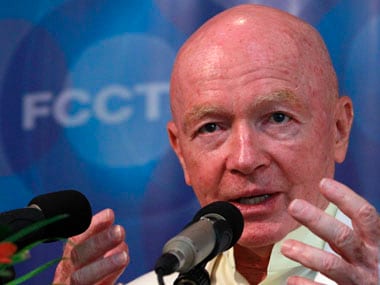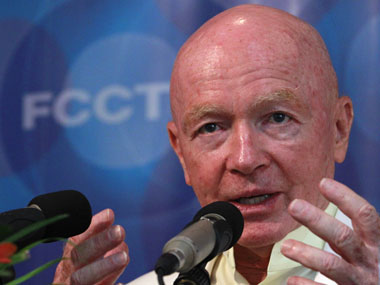New York: The widely anticipated pullback in the US Federal Reserve’s bond buying program is sounding a death knell for emerging market stocks, bonds and currencies. The 20 biggest emerging market currencies tumbled on Monday against the US dollar with India’s rupee plunging 2.5 percent to a record low of 63.22 against the US dollar.
Financial markets in India seem to be caught in a vicious cycle where losses in one asset are destroying confidence in the others. The rupee’s loss on Monday dragged both stocks and bonds lower. India’s 30-stock BSE Sensex, which had fallen 4 percent on Friday, tumbled another 1.6 percent on Monday to close at 18307.52 points. Yield on the benchmark 7.16 percent 2013 government bond rose to a five-year high of 9.23 percent.
[caption id=“attachment_1045817” align=“alignright” width=“380”]  Mark Mobius bullish on emerging markets, but not India. Reuters[/caption]
Global investors are betting the Fed will start winding down its $85 billion per month bond buying purchases by $20 billion at the September 17-18 policy meeting, a view that got a boost from positive US employment data last week. That belief already has drawn billions of dollars in capital back to US assets with investors increasingly seeking the relative safety of American equities.
Almost $95 billion was poured into exchange-traded funds of American shares this year, while developing-nation ETFs saw withdrawals of $8.4 billion, according to data compiled by Bloomberg.
“The US is seen as the most stable economy at the moment, and the equity market is viewed as having better prospects than the rest of the world,” James Gaul, a fund manager at Boston Advisors LLC, told Bloomberg BusinessWeek.
“The weakness in emerging markets and the associated economic troubles have encouraged some investors to reallocate from the emerging world to the US.”
Capital is fleeing emerging markets as India’s gaping current-account deficit puts grinding pressure on the rupee, China’s economy grows at the slowest pace in 13 years, and persistent inflation in Brazil erodes purchasing power.
“With the US economy on the rebound and flat growth in emerging markets, Western firms expect better returns back home,” said Amrish Shah, who advises clients on mergers and acquisitions at Ernst & Young.
Countries such as India, China and Brazil are facing lower potential growth, slowing credit and tighter financial conditions as foreign investors consider pulling their cash out of emerging markets in favor of higher returns in the US, where long term interest rates are rising.
“The results could be sustained capital-flow reversals and lower growth in emerging markets,” warned the International Monetary Fund (IMF).
Last month, the IMF cut India’s growth outlook for 2013-14 to 5.6 percent from the 5.8 percent it projected in April, saying the prospect of the Fed unwinding easy-money policies was aggravating a slowdown in emerging markets.
Foreign investors hold around $250 billion of Indian stocks, according to research from Bank of America Merrill Lynch. The Sensex is down nearly 6 percent this year, and analysts say some foreign investors are cutting their losses in case there are further declines.
Mark Mobius bullish on emerging markets, but not India
Mark Mobius, executive chairman of Templeton Emerging Markets Group thinks Fed tapering fears are overblown.
“This fear of tapering is quite overdone,” Mark Mobius executive chairman of Templeton Emerging Markets Group, told CNBC. Franklin Templeton manages around $834.1 billion.
“What people fail to realize is that the so-called tapering is on top of an incredible increase in money supply in the US,” he said. “These QE programs have been cumulative. It’s not a situation where one stops and all that money goes away,” he said. “It stays in the system.”
“You’re going to see more money going into emerging markets,” Mobius predicted.
But Mobius is less optimistic on the outlook for India. He said he is concerned about the country’s bureaucracy. “They’re just moving too slowly,” he said, adding the barriers to investment are too high. While he still invests in the country, “it’s not at the top of the list.”


)
)
)
)
)
)
)
)
)



